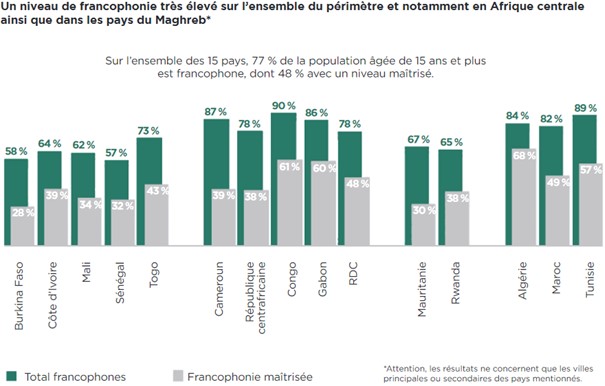The Status of the French Language in North Africa
Abstract
This study focuses on the current linguistic situation in certain North African countries and the changing status of the French language during this last year due to ideas proposed to favor the English language (Erling, 2021). First of all, the study analyses the linguistic situation of three countries, Algeria, Tunisia and Morocco. Then, it discusses the hypothesis and the evolution of the French language in the aforementioned countries. Following that, the methodology is explained. It uses a qualitative approach that is based on the observation to reach appropriate conclusions. The next section examines the status that the French language has in the three mentioned countries to compare it with the previous year (2022). This is according to the information from the summit of Francophonie in Djerba (Kasri, 2022). Finally, the challenges required to improve the situation are reflected upon and relevant conclusions are presented.
References
African Manager. (2023). L’Algérie décide de remplacer la langue française par l’anglais dans les universités, dès septembre. retrieved from https://africanmanager.com/lalgerie-decide-de-remplacer-la-langue-francaise-par-langlais-dans-les-universites-des-septembre/
Afriki (2023). Un passage du Maroc à l’anglais entraînerait une régression économique et sociale durable. retrieved from https://www.financialafrik.com/2023/01/10/un-passage-du-maroc-a-langlais-entrainerait-une-regression-economique-et-sociale-durable/
Azouzi, A. (2008). Le français au Maghreb: Statut ambivalent d’une langue. Synergies Europe, 3, 37-50.
Bassalah, I. (2009). Les femmes au miel et autres histoires joyeuses de l’immigration. Paris: éditions Michalon.
Belaskri, Y. (2012). Une longue nuit d’absence. Paris: Vent d’ailleurs.
Benchekroune, S. (2017). L’héritage des femmes. France: Empreintes.
Benkirane, K. (2019). Voix marocaine au Canada. Canada: Harmattan.
Benítez Fernández, M. (2023). Linguistic variation, social meaning and convert prestige in a Northern Moroccan Arabic variety. Languages, 8, 1-19. https://doi.org/10.3390/languages8010089
Bennoune, K. (2013). Votre falwa ne s’applique pas ici: histoires inédites de la lutte contre le fondamentalisme musulman. France: Les éditions du temps présent.
Ben Jelloun, T. (2018). Le racisme expliqué à ma fille. France: Points.
Bey, M. (2009). Puisque mon cœur est mort. France: Editions de l’Aube.
Beyza, B. (2011). English as a lingua franca in higher education: implications of EAP. Ibérica, 22, 79-100.
Bhandari, P. (2023). What Is Qualitative Research? Methods & Examples. Scribbr. Retrieved from https://www.scribbr.com/methodology/qualitative-research/.
Bianchini, L. (2007). L’usage du français au Maghreb. Constellations francophones, Publifarum, 7, 2-7.
Bikandi Ruiz, U. (2012). El plurilingüismo visto los documentos europeos: una mirada crítica. Textos de didáctica de la lengua y de la literatura, 60, 67-76.
Bouamama, S. (2018). La obra negativa del colonialismo francés y europeo en África. Belgium: CADTM.
Brown, A. (2020). Arabic-French Code switching in the Maghreb: An Examination of Changes in Syntax and Perceptions. United States: Swarthmore College.
Byram, M. (2006). Languages and Identities. Language of Schooling: Towards a framework of Europe. Retrieved from https://rm.coe.int/preliminary-study-languages-and-identities-intergovernmental-conferenc/16805c5d4a
Chakik, N. (2005). Nos jours aveugles. France: Editions des femmes.
Chraibi, Gh. (2022). Les territoires impuissants. Belgium: Éditions Maelström.
Daoud, K. (2015). La préface du nègre. Alger: Barzakh.
DirectInfo. (2016). L’anglais remplacera le français comme 2ème langue d’enseignement en Tunisie. Retrieved from https://directinfo.webmanagercenter.com/2016/10/27/langlais-deuxieme-langue-denseignement-au-lieu-du-francais/.
Erling, E. (2021). La relation entre l’anglais et l’employabilité. British Council. Retrieved from https://www.britishcouncil.org
France 24. Quelle place pour la langue française dans le monde ? Retrieved from https://www.youtube.com/watch?v=wmHIOki9ZCQ
Filali, A. (2020). Chronique d’un décalage. Tunisia: Elyzad.
Filhon, A. (2021). L’afrique du Nord: un payasage linguitique pluriel. Langues d’ici et d’ailleurs, 31-60. https://doi.org/10.4000/books.ined.3277
García Sanz, M. P. & García Meseguer, M. (2012). Los métodos de investigación. Madrid: UCM.
Ghachem, M. (1994). L'Épervier: Nouvelles de Mahdia, Paris: Société polygraphique Mang.
Ghorbel, W. (2016). Le jasmin noir. Tunis: Maison tunisienne du livre.
Guerrero Bejarano, M. A. (2016). La investigación cualitativa. Innova Reasearch Journal, 1, 1-9. https://doi.org/10.33890/innova.v1.n1.2016.2
Guevara Alban, G. P. & Verdesoto Arguello, A. E. & Castro Molina, N. E. (2020). Metodologías de investigación Educativa (descriptivas, experimentales, participativas, y de investigación-acción). Mundo de la investigación y el conocimiento, 3, 163-173.
Hosni, Kh. (2021). Le prix du cinquième jour. Tunisia: Arabesques.
Isilow, H. (2012). Africa turns to Russia, China for Covid-19 vaccine. AA. Retrieved from https://www.aa.com.tr/en/africa/africa-turns-to-russia-china-for-covid-19-vaccine/2164154
Kasri, E. (2022). Sommet de Djerba: Quel avenir pour la Francophonie en Tunisie. Kapitalis. Retrieved from https://kapitalis.com/tunisie/2022/11/19/sommet-de-djerba-quel-avenir-pour-la-francophonie-en-tunisie/
Khadra, Y. (2023). Les vertueux. France: Mialet-Barrault.
Kerras, N. & Baya Essayahi, M. L. (2022). Analysis of the Algerian Novel Fahla (Rabah Sbaa) from a Sociolinguistic Approach. AWEJ for Translation & Literary Studies, 6(4), 15-31. https://doi.org/10.2139/ssrn.4283340
Kerras, N., & Serhani, M. (2021). Francophonie: le cas de l’Algérie et de Montréal, une étude sociolinguistique. Akofena, 3, 317-334.
Kerras, N., & Baya Essayahi, M. L. (2022). Analysis of the Algerian Novel ‘Fahla’ from a Sociolinguistic Approach. AWEJ, 6, 15-31. https://doi.org/10.24093/awejtls/vol6no4.2
Kerras, N., & Faber, P. (2012). The Translation of Advertising Texts in Culturally-Distant Languages: The Case of Spanish and Arabic. Bahri, 24, 1-10.
Labbize, S. (2020). J’aurais voulu être un escargot. France: Les lisières.
Manzano, F. (2007). Sur l’implantation du français su Maghreb: systémique et fractures identitaires au tournant des XIX et XX siècle. Le Français en Afrique, 22, 5-42.
Minwas, A., & Sabri, S. (2023). A Review on Identity from a Linguistic and Sociological Perspective. International Journal of Social Sciences & Educational Studies, 9(4), 2-13. https://doi.org/10.23918/ijsses.v9i4p225
Observatoire de la langue française de l’Organisation Internationale de la Francophonie (2018). Usages et avenir du français dans l’espace francophone du sud. Retrieved from https://www.observatoire.francophonie.org
Organisation Internationale de la Francophonie (March 2022). La langue française dans le monde. Paris: Gallimard.
Saïd, A. (2009). L’absence inachevée. Paris: La différence.
Sánchez Fernández, J. (2001). El paso del tiempo de la historia de la lengua (el origen de las lenguas. Biología y lingüística). Philologia hispalensis, 15(2), 179-189. https://doi.org/10.12795/PH.2001.v15.i02.12
Sansal, B. (2021). Lettre d’amitié, de respect et de mise en garde aux peuples et aux nations de la terre. Paris: Gallimard.
Slimanie, L. (2016). Chanson douce. Paris: Gallimard.
Thibault, A. (2022). Le français au Maghreb – le français au Liban. Francophonie et variété des Français. Paris: Sorbonne.
Tossa, M. (2022). Reducción de visados para el Magreb, una estrategia francesa que ya no tiene razón de ser (politólogo). Agence Marocaine de Presse. Retrieved from https://www.mapnews.ma/es/actualites/pol%C3%ADtica/reducci%C3%B3n-de-visados-para-el-magreb-una-estrategia-francesa-que-ya-no-tiene
TV5Monde. Algérie: l’anglais remplace le français en première langue étrangère á l’université. Retrieved from https://www.youtube.com/watch?v=wTEPsINkKSQ
Zouari, F. (1999). Ce pays dont je meurs. Paris: Ramsay.


This work is licensed under a Creative Commons Attribution 4.0 International License.
Copyright for this article is retained by the author(s), with first publication rights granted to the journal.
This is an open-access article distributed under the terms and conditions of the Creative Commons Attribution license (http://creativecommons.org/licenses/by/4.0/).








1.png)

















